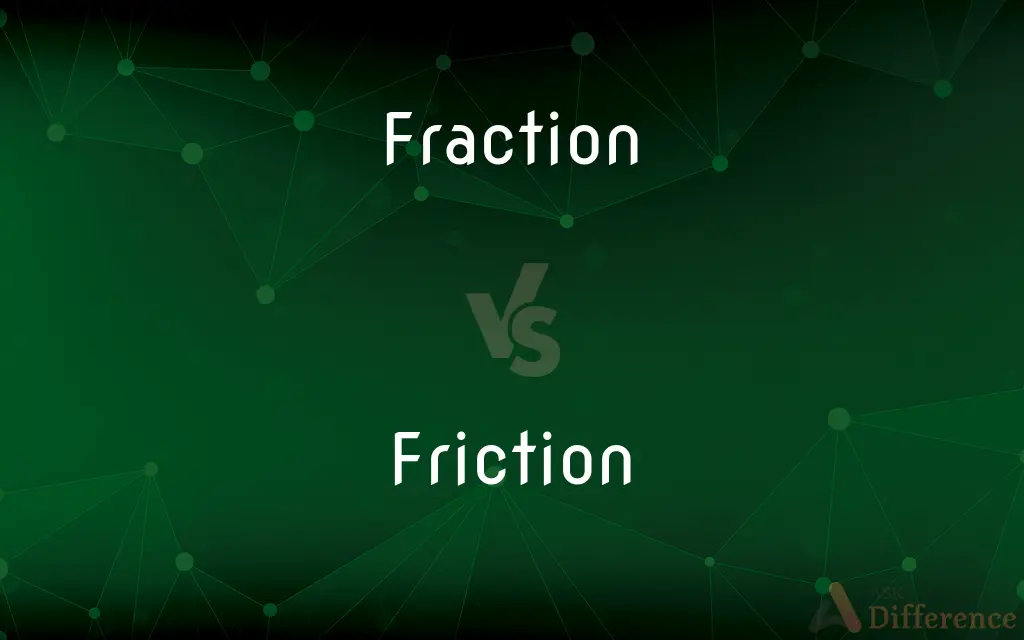Fraction vs. Friction — What's the Difference?
By Fiza Rafique & Urooj Arif — Updated on March 26, 2024
Fraction denotes a mathematical expression representing division, while friction refers to the resistance between surfaces in motion.

Difference Between Fraction and Friction
Table of Contents
ADVERTISEMENT
Key Differences
Fraction is a concept in mathematics that describes a part of a whole or a division of quantities. Friction, on the other hand, is a physical phenomenon that occurs when two surfaces move or attempt to move across each other.
While fractions are abstract representations used in calculations and reasoning about quantities, friction is a tangible physical force experienced in the real world. The study of fractions falls within the realm of mathematics, involving numerical analysis and problem-solving skills. Friction, however, is studied in physics, particularly in mechanics, where it is analyzed in terms of its causes, effects, and how it can be minimized or utilized effectively.
Fractions serve as a tool for expressing and manipulating numbers, especially when dealing with parts of a whole. They are essential for understanding ratios, proportions, and the concept of division. Friction, conversely, involves understanding interactions between materials and surfaces, focusing on the forces that arise from these interactions and their impact on movement and energy.
The distinction between fraction and friction lies in their definitions and applications: fraction is a mathematical expression used for division and representing parts of a whole, while friction is a physical force that resists motion between contacting surfaces. Both concepts, though vastly different in nature, play significant roles in their respective fields, contributing to our understanding of the world through mathematics and physics.
Comparison Chart
Definition
A mathematical expression representing a part of a whole.
The resistance that one surface encounters when moving over another.
ADVERTISEMENT
Field
Mathematics
Physics, particularly mechanics
Key Concepts
Numerator, denominator, division, parts of a whole
Resistance, motion, force, surface interactions
Applications
Calculations, measurements, financial analysis
Vehicle dynamics, machinery, athletic performance
Importance
Essential for understanding division, ratios, and proportions
Crucial for motion control, energy efficiency, safety
Compare with Definitions
Fraction
Measurement tool.
Fractions are used in cooking to measure ingredients accurately.
Friction
Physical phenomenon.
The friction force arises when two surfaces rub against each other.
Fraction
Financial application.
Fractions are used to calculate interest rates and stock values.
Friction
Safety mechanism.
Brake systems in vehicles use friction to slow down or stop.
Fraction
Part of a whole.
In a cake divided into 8 equal parts, each part represents the fraction 1/8 of the whole cake.
Friction
Energy consideration.
Friction converts kinetic energy into heat, affecting energy efficiency.
Fraction
Division representation.
The fraction 3/4 represents dividing something into 4 parts and taking 3 of them.
Friction
Athletic performance.
Athletes use shoes with good friction to enhance performance and prevent falls.
Fraction
Mathematical operations.
Fractions can be added, subtracted, multiplied, and divided in mathematical problems.
Friction
Resistance to motion.
Friction between car tires and the road prevents slipping.
Fraction
(Mathematics) An expression that indicates the quotient of two quantities, such as 1/3 .
Friction
Friction is the force resisting the relative motion of solid surfaces, fluid layers, and material elements sliding against each other. There are several types of friction: Dry friction is a force that opposes the relative lateral motion of two solid surfaces in contact.
Fraction
A disconnected piece; a fragment.
Friction
The resistance that one surface or object encounters when moving over another
A lubrication system which reduces friction
Fraction
A small part; a bit
Moved a fraction of a step.
Friction
The rubbing of one object or surface against another.
Fraction
A chemical component separated by fractionation.
Friction
Conflict, as between persons having dissimilar ideas or interests; clash.
Fraction
A part of a whole, especially a comparatively small part.
Friction
(Physics) A force that resists the relative motion or tendency to such motion of two bodies or substances in contact.
Fraction
(arithmetic) A ratio of two numbers (numerator and denominator), usually written one above the other and separated by a horizontal bar called the vinculum or, alternatively, in sequence on the same line and separated by a solidus (diagonal bar).
Friction
The rubbing of one object or surface against another.
Fraction
(chemistry) A component of a mixture, separated by fractionation.
Friction
(physics) A force that resists the relative motion or tendency to such motion of two bodies in contact.
Fraction
(Christianity) In a eucharistic service, the breaking of the host.
Friction
Massage of the body to restore circulation.
Fraction
A small amount.
Friction
(figuratively) Conflict, as between persons having dissimilar ideas or interests; clash.
Fraction
(archaic) The act of breaking, or state of being broken, especially by violence.
Friction
(Second Sino-Japanese War) Conflict, as between the Communists and non-Hanjian Kuomintang forces.
Fraction
To divide or break into fractions.
Friction
The act of rubbing the surface of one body against that of another; attrition; in hygiene, the act of rubbing the body with the hand, with flannel, or with a brush etc., to excite the skin to healthy action.
Fraction
The act of breaking, or state of being broken, especially by violence.
Neither can the natural body of Christ be subject to any fraction or breaking up.
Friction
The resistance which a body meets with from the surface on which it moves. It may be resistance to sliding motion, or to rolling motion.
Fraction
A portion; a fragment.
Some niggard fractions of an hour.
Friction
A clashing between two persons or parties in opinions or work; a disagreement tending to prevent or retard progress.
Fraction
One or more aliquot parts of a unit or whole number; an expression for a definite portion of a unit or magnitude.
Friction
A state of conflict between persons
Fraction
To separate by means of, or to subject to, fractional distillation or crystallization; to fractionate; - frequently used with out; as, to fraction out a certain grade of oil from pretroleum.
Friction
The resistance encountered when one body is moved in contact with another
Fraction
A component of a mixture that has been separated by a fractional process
Friction
Effort expended in rubbing one object against another
Fraction
A small part or item forming a piece of a whole
Fraction
The quotient of two rational numbers
Fraction
Perform a division;
Can you divide 49 by seven?
Common Curiosities
What role does friction play in energy consumption?
Friction typically increases energy consumption by converting mechanical energy into heat, necessitating more power to maintain movement.
Can fractions be negative?
Yes, fractions can represent negative quantities, indicating parts of a whole taken away or in a deficit.
What determines the amount of friction between surfaces?
The amount of friction is influenced by the nature of the surfaces in contact and the force pressing them together.
Is friction always undesirable?
No, while friction can lead to wear and increased energy consumption, it is essential for many activities, like walking or driving, where it prevents slipping.
How do you reduce friction?
Friction can be reduced by smoothing surfaces, using lubricants, or changing the materials in contact.
How is fraction simplification done?
Fraction simplification involves dividing the numerator and the denominator by their greatest common divisor.
Why are fractions important in everyday life?
They allow for precise measurements, calculations, and understanding of parts relative to a whole in various contexts.
How does fraction division work?
Dividing fractions involves multiplying the first fraction by the reciprocal of the second.
Why do heavier objects not necessarily have more friction?
While the normal force (related to weight) affects friction, the coefficient of friction between materials plays a crucial role, meaning heavier objects don't always experience more friction.
What are the different types of friction?
The main types include static friction (resisting the start of motion), kinetic friction (resisting movement), and rolling friction (resisting rolling motion).
Can fractions be converted into decimals?
Yes, fractions can be converted into decimals by dividing the numerator by the denominator.
How do antifriction materials work?
Antifriction materials, like Teflon, reduce the frictional force by providing a smoother surface or by introducing a lubrication layer.
Can friction be eliminated entirely?
It's practically impossible to eliminate all friction, though it can be minimized in specific applications through lubrication and surface treatments.
What are mixed numbers in fractions?
Mixed numbers combine a whole number with a fraction, representing quantities greater than a whole but with a fractional part.
What is the importance of fraction in ratios and proportions?
Fractions are essential in expressing ratios and proportions, helping to compare different quantities or parts of a whole accurately.
Share Your Discovery

Previous Comparison
Jesse vs. Jessie
Next Comparison
Baguette vs. BreadstickAuthor Spotlight
Written by
Fiza RafiqueFiza Rafique is a skilled content writer at AskDifference.com, where she meticulously refines and enhances written pieces. Drawing from her vast editorial expertise, Fiza ensures clarity, accuracy, and precision in every article. Passionate about language, she continually seeks to elevate the quality of content for readers worldwide.
Co-written by
Urooj ArifUrooj is a skilled content writer at Ask Difference, known for her exceptional ability to simplify complex topics into engaging and informative content. With a passion for research and a flair for clear, concise writing, she consistently delivers articles that resonate with our diverse audience.













































